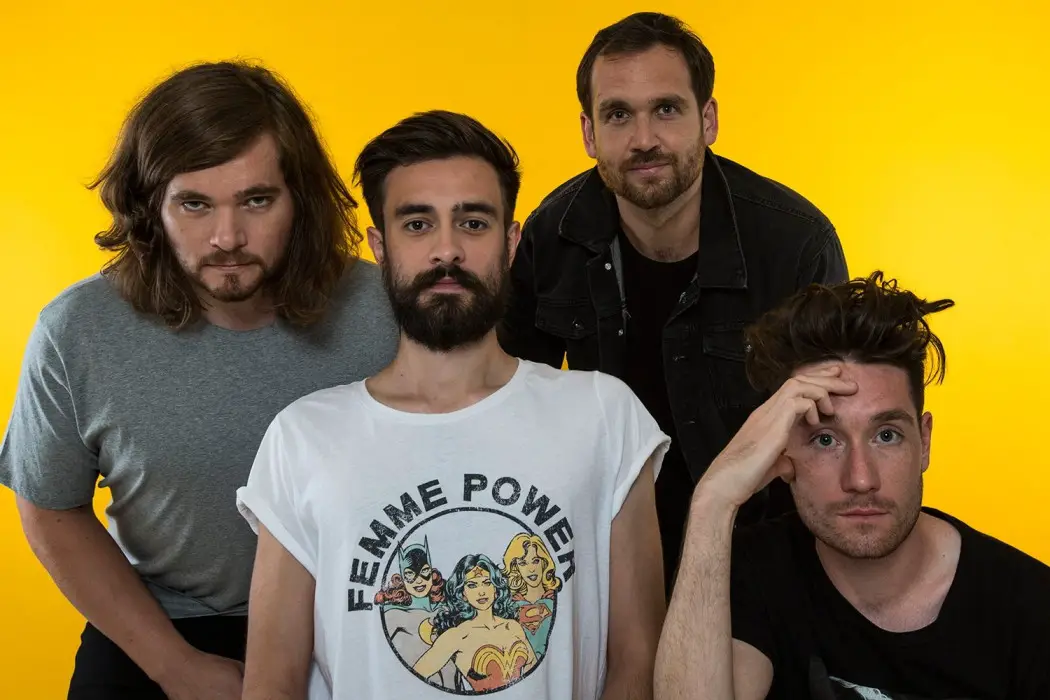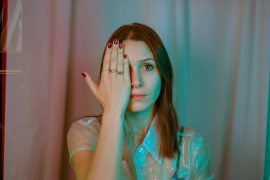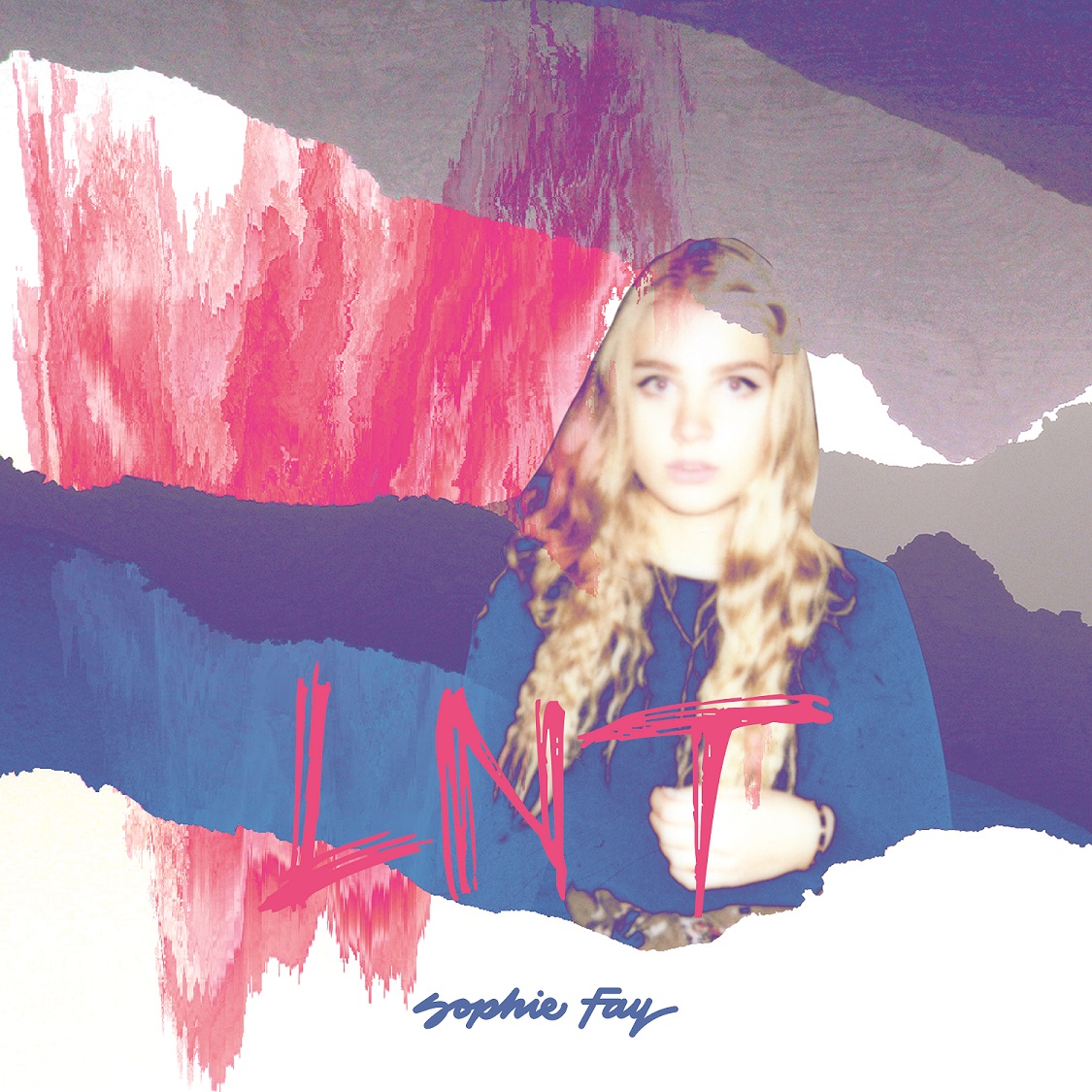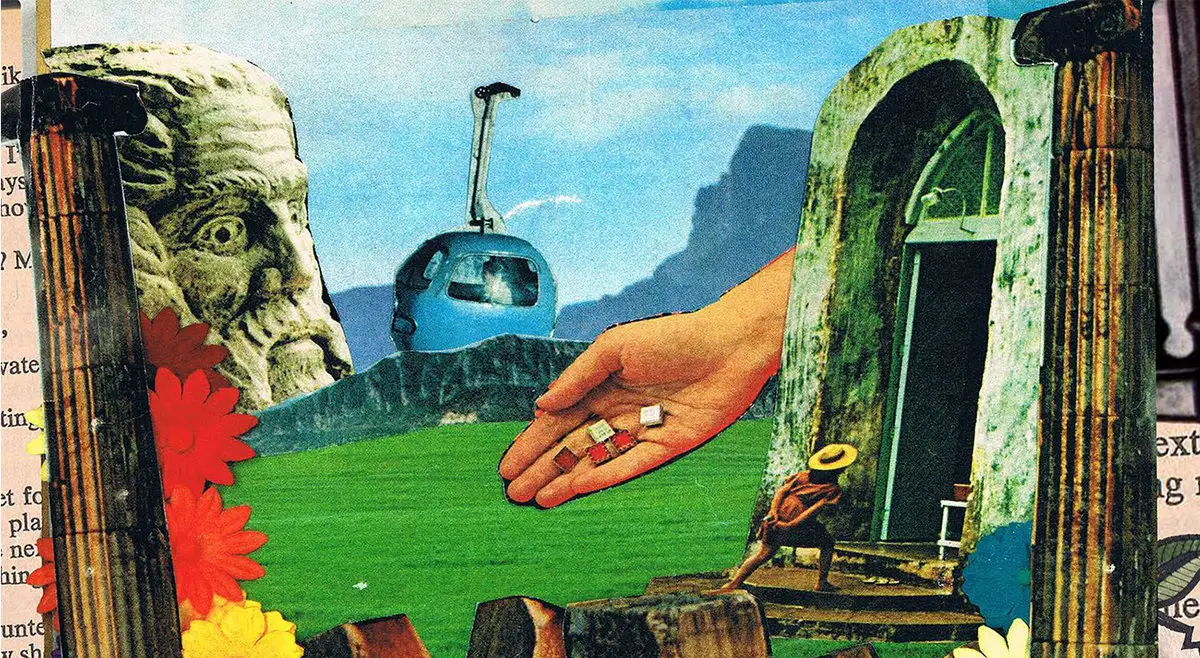Bastille’s Will Farquarson doesn’t think the world is ending: For all the bad blood in this wild world, the band’s apocalyptic party album ‘Doom Days’ balances darkness with light, hope, and love.
— —
It’s very easy to just be absolutely negative and feel like the world’s collapsing around you, but I think hope is what’s required if we’re to get through any of this mess.
For many of us, the world feels very dark right now – darker than it’s ever felt before. Political and racial tensions seem to be at a constant boiling point throughout the United States and Europe, with the 24-hour news cycle keeping viewers like us in a state of panic and impending ruin. There’s always something to be worried about; there’s always another good fight to be fighting.
Is life as we know it coming to an end, or are we just that much more connected, aware, and sensational in our media?
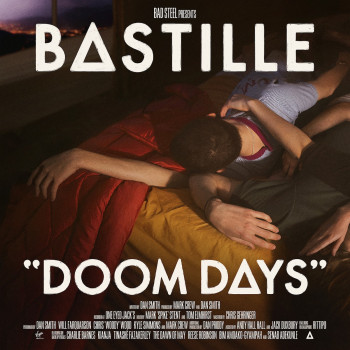
When Bastille released their sophomore album Wild World in 2016, the band’s thesis seemed to be one of angst and perseverance: “It’s about human relationships set against the backdrop of political, geopolitical turmoil and the overwhelming, crazy world,” multi-instrumentalist Will Farquarson said in our interview at the time.
On their recently-released third album Doom Days, the British band continue to wrestle with the stresses of life during the end of days, ultimately concluding with a message of hope, joy, and love. Released June 14, 2019 via Virgin Records, Doom Days is loosely constructed as an “apocalyptic party album” that starts with the decision to stay out late, and ends with waking up the next morning after a long, tumultuous night.
It’s a quarter past midnight
As we cut through the city
the streets are getting restless
Good times, bad decisions
it’s a quarter past midnight
And the sirens are mending some hearts
But we’re the losers on our back seats
Singing “Love Will Tear Us Apart”
It’s a quarter past midnight
Still avoiding tomorrow
It’s a quarter past midnight
But we’re just getting going
– “Quarter Past Midnight,” Bastille
Though Bastille haven’t been explicit about it, Doom Days feels very much like the end of an album trilogy throughout which they confronted internal and external demons via intimate and individualized portraitures. Doom Days‘ anthems and ballads form poignant calls for togetherness and vulnerable cries for help; as described in Atwood’s album review, Doom Days “is a masterclass in finding the balance between the effervescent and the melancholy.”
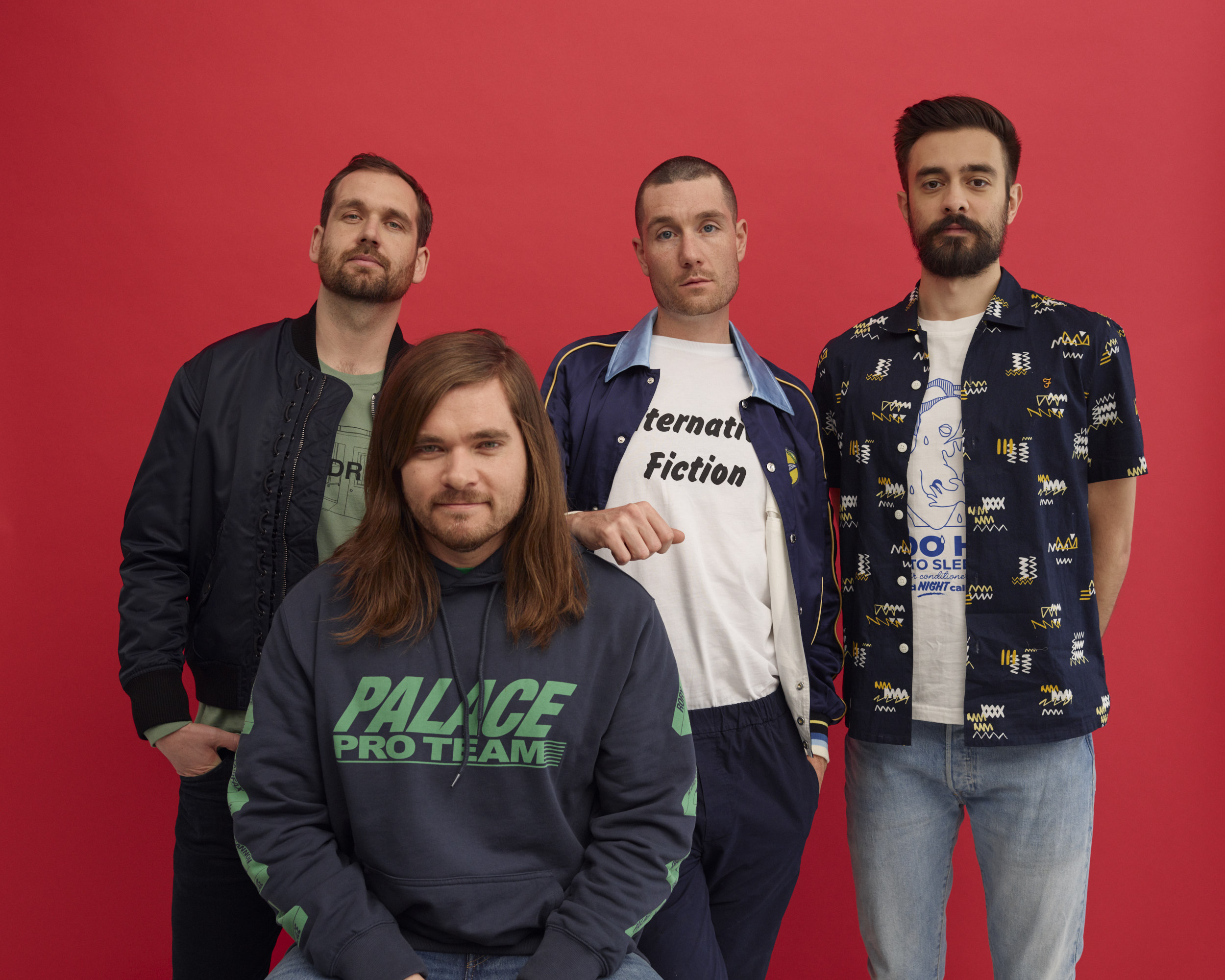
But whereas Bastille previously dwelt in grief, sorrow, and drama ’til the end, this time around they’ve found a spark of light in the darkness. “It’s sort of accepting the world as it is,” Will Farquarson says of Doom Days‘ conceptual conclusion. “Accepting, you know, adult life and all the anxieties of modern living, tempestuous natures, politics. One of the main themes of the album is human relationships and escapism, and using music and the people we love and partying as an attempt to escape the forces that operate on us on a sort of grander scale…”
Roll the window down, let the air blow ’round you
A sadness in the breeze as the night divides us
In these darker days, I push the limit to the love you offer
There’s a riot in my head, demanding we do this forever
Why would we divide when we could come together?
Just bodies that collide, lost and found each other
So don’t, don’t leave me alone
Don’t leave me alone, don’t leave me alone
Why would we divide when we could come together?
– “Divide,” Bastille
This simpler examination of Doom Days glosses over the album’s incredibly intimate poetry and its powerfully emotive music, much of which is on a scale not previously seen or heard from the quartet. The album’s highs are quite high and its lows quite low, but the flux in-between is that much more nuanced than ever before as Bastille elevate their work with the help of musical friends and collaborators.
By the time the album’s penultimate track “Those Nights” rolls into “Joy,” Bastille are ready to relinquish their stranglehold on anxiety and just bask in the present moment. Farquarson says it best: “If the question posed at the beginning of, if we’re calling it a “trilogy,” on “Pompeii” is, “How am I going to be an optimist?” then that’s the answer, I guess: Just take solace in relationships and people, because all we have is people. There’s nothing else.”
For all the melancholy, division, and bad blood in this wild world, perhaps we will make it through these doom days after all.
Atwood Magazine recently caught up with Will Farquarson to discuss the glimmer and gloom of Doom Days. Dive deep into Bastille’s latest installement in our interview below!
Then I feel my pulse quickening
But regrets can’t change anything
Yeah, I feel my pulse quickening
When your name lights up the screen
Oh joy, when you call me
I was giving up, oh, I was giving in
Joy, set my mind free
I was giving up, oh, I was giving in
How’d you always know when I’m down?
– “Joy,” Bastille
A CONVERSATION WITH BASTILLE
Atwood Magazine: Hey Will, thanks for catching up! After a long wait, Doom Days is finally released: How does it feel to have Bastille's third album out and in the world?
Will Farquarson: Oh, it’s a relief. It’s been a long time coming, this one. We kind of had it geared up to go last year, in fact when we released “Quarter Past Midnight,” and then we just didn’t feel quite like it was ready, so we decided to put the breaks on a bit, and go back to the studio, and really have a tweak. It came just after we’d been on tour with our orchestra project that we did, which was called “ReOrchestrated,” where we took a string section, a horn section, and an entire choir. When we finished that, we felt like there was such great energy on stage, having this sort of collaborative element, and we wanted to kind of capture some of that on the record. So we went back into the studio, and postponed the release a bit… So for instance, “Joy,” our new single, has a friend of ours, Ben, who’d sang in choir all over it. A lot of the musicians that we worked with on that tour ended up being on the record. I think it was a good decision, because it ultimately meant that the record, we think is much, much more complete and a better product for it.
Some interesting quotes I've been collecting recently about the new record and just what people are saying about Bastille, was that you “orchestrate immersive theatrical experiences,” according to The Independent. Meanwhile, one of our own writers describes Doom Days as a “nostalgic dystopian future that feels eerily realistic.” It sounds like you put a lot of thought and care into each song, to be greater really than the sum of its parts.
Will Farquarson: I can only speak from my own experience, but I think when anyone creative does anything, you always strive to be the best it can be. I don’t think… When we made the other two albums, we were throwing 100% of ourselves into it. So I don’t think the process has changed that much; with this album, we weren’t particularly trying to strive for our best; I think that’s just how we work. But yeah, I think the thing that’s nice about this one is… I think one thing that was different about this, actually, from the other two, is that it was more of a focused singular effort… When you make your first album, its just a collection of all the songs that you’ve written over the years, and then your second album, we didn’t really have a chance to take us off the gas because we were touring so much, so a lot of that was done on the road and there was never one period and one place where we stopped and sat down to read, write, and record…
Whereas this time around, we managed to get six months off and we were in London. We’ve got a new studio in London that we’ve built ourselves; it’s nice to have a base. We just took six months to do all the writing, all the recording, and to get in the studio.
There’s also a kind of concept to this album – a sort of narrative arc, which the other albums didn’t necessarily have, so I think it does fill the glass a little bit more like a singular piece of work that isn’t just a collection of songs; at least that was the intention.
I definitely feel that. I feel like there's a story, and a lot of people have discussed how there's a story element to it, even though we don't need to know all the details of the story. It's more like a collective experience.
Will Farquarson: Yeah, I mean, I think what’s interesting is the over-arching narrative is that we’ve been calling it the “apocalyptic party album,” It’s just an imagined night out during, you know, we’ve been saying the apocalypse or the end of the world, but I think that’s open to interpretation. Whether that’s a literal Armageddon or just, you know, it could be the breakup of a relationship or something rather tumultuous happening in someone’s life. So we wanted to leave that open to interpretation of the listener.
But the thing that I think ties it all together is that each song represents a point in the night out that have been track-listed as one, two, three, four: They’re track-listed as the time during the night out that they represent. I feel that’s kind of a nice touch, because then you can interpret the songs as you will, and you can write your own narrative, but it still has that structure of being very much set over this period from “Quarter Past Midnight,” the opening track, which is when you’ve made the decision to stay out rather than go home — and then “Joy,” which is about waking up in the morning.
So for me as somebody who's usually asleep by three o'clock, should I just stop listening after the seventh track?
Will Farquarson: Yeah. I mean for me, it’s been a long time since I’ve stayed out after midnight. I think Dan and Kyle still like to have a party from time to time.
You always have the occasional escapade... Do Bastille still have those wild nights out? Do you still find the time to have that escapade every once in awhile?
Will Farquarson: Yeah. I think the only difference is we used to have them every night when we first started. And I think time has the habit of catching up with you. I think also we often talk about in the first year or two years, of having found some success, it’s just so incomprehensibly dreamy: You spend your entire life working towards this goal; when we finally kind of “had some success,” it was a massive party. And then you have to learn spaces off, because suddenly it’s your job and you’re doing it every night and it involves singing, and drinking isn’t conducive to good singing. So I think now we’re a little more measured… Yeah, it becomes less a daily routine, more of a, you pick your battles on that one.
I hear you on that! So you and I actually last spoke in December 2016, which feels like a full lifetime ago.
Will Farquarson: God, that was a long time ago…
It was a very long time ago! What's funny to think about is, so we were speaking just after Wild World was released and it felt like things were in shambles politically, socially at the time. We had no idea what was coming though. We had no idea of what was around the corner.
Will Farquarson: Yeah. It seems like the glory days now.
It does! Is that something that is to be looked at in a dark sense of, foreboding and omen?
Will Farquarson: I’m slightly divided and ambivalent about this point: Certainly we’re in a very strange time, and it’s time I think, that could go very horribly wrong if we’re not careful in terms of how divisive politics has become here and in Europe and the rise of all sorts of right wing elements… and obviously Trump, above it. However, if you take a broader perspective, I don’t know that things are particularly more divided than they were, say, during the 1960s in the Vietnam War and the assassination of the president…
I think it’s very easy, especially with 24 hour news media and social media, to really become fatalistic and despondent and think negative about it. In Britain we have obviously Brexit that’s a huge, hugely divisive and difficult thing. And it is kind of noticeable that the politics is certainly, and society certainly feels a bit more ruptured than it did 10, 15 years ago. However, I chatted my dad who’s older than me and he was talking about the miners’ strike and the politics of the 1970s and ’80s in Britain, and how class divisions and social upheaval then was as bad as it is now. I am unconvinced that this is the absolute nadir of civilization, but I am cautious that we could be heading towards something rather worse if we don’t combat it.
It’s not the nadir; it’s not the lowest point yet. Hopefully we can sort of come back from the brink. But yeah, I don’t think all hope is lost just yet.
I hope you're right! So when we spoke, I actually asked you this question about Wild World, and now I want to ask you this question about Doom Days: Wild World feels in parts like a continuation of where Bad Blood left off. How does Doom Days pick up after Wild World?
Will Farquarson: I think Bad Blood was sort of a coming-of-age record reckoning with becoming an adult, really. It was written when we were young adults. Wild World is slightly pessimistic and gloomy, and sort of reckoning with tumultuous natures. I think this one is sort of a completion of almost like a trilogy, and in that it’s sort of accepting the world as it is: Accepting, you know, adult life and all the anxieties of modern living, tempestuous natures, politics. One of the main themes of the album is human relationships and escapism, and using music and the people we love and partying as an attempt to escape the forces that operate on us on a sort of grander scale, but perhaps are not necessarily positive and may be beyond our control. So I think that’s kind of… You want to just see it as a sort of three-act play of the realization of kind of coming-of-age, worrying about the load, and then just being like, “Fuck it! It is what it is; let’s just get drunk.”
That’s a very crude, reductive synopsis, but I think it does feel like the third part of something. I dunno what we’re going to do next, and maybe it’s time to think about some different subject matter. It does feel like the three albums kind of relate all about concerns and worries and anxiety… It was very interesting to write about, but who knows what the next one will be about!?
There's two ways to look at that, but I think what's really interesting is if we do take it that way, then this all begins with “Pompeii” and it fittingly concludes with “Joy”! Throughout that, we see a lot of... I think what Bastille do so well is you're able to internalize and externalize turbulence: Specifically, you can make something that is happening all around us that is so ephemeral, feel like it's happening to you personally, and you can take the same thing that's only happening to you, and blow it up!
Will Farquarson: Yeah. I mean, I don’t want to speak deeply philosophical, that’s just the nature of the human condition: We’re all eventually solipsists, and the only consciousness you ever experience is your own. Everyone’s perception of something as global as what’s going on in Europe, what’s going on here politically; that’s still only their perception of it. Equally, if you have a breakup it’s the end of the world, as far as you know… I think that’s probably just a reflection of the psychology of humanity, I guess.
While I agree with you, that doesn't necessarily mean that everybody has the ability to put ideas into such an eloquent format. I think that it's the distillation of these ideas that really is so brilliant. On the song “Divide”: “Why would we divide when we could come together? Looking back around, glamorize the chaos. Don't let summer nights destroy everything before us.” There's so much more said there, than the layman might necessarily pick up or put down!
Will Farquarson: That’s more of a compliment for Dan, but yeah that’s his gift isn’t it? To be able to sort of capture as all the great poets do. I remember reading once… I don’t have the direct to make this quote but Ralph Waldo Emerson said (and I’m paraphrasing), “The greatest knowledge is the knowledge you discover when you read someone else.” Or you discover what you’ve always known. It’s an idea that Plato espoused as well, but you never learn anything; you just re-remember things a priori. I think one of the great challenges of songwriting, I guess, is to be able to connect with people and come up with ways of saying things that people have always felt – that they knew, but were ineffable, inexplicable, or incommunicable in some way. A lot of people sort of say I’ve always, without even knowing it, had those concerns, or I felt that way, but I didn’t know how to articulate it. So I think that’s testament to how gifted Dan is.
I think one of the great challenges of songwriting, I guess, is to be able to connect with people and come up with ways of saying things that people have always felt.
Diving specifically into you and your role... One of the things that's so exciting about Bastille's sound is that it's been constantly evolving too, while also maintaining a certain signature that goes beyond just Dan's voice. How have you developed musically, in the past three to four years? How do you feel you have grown as an artist and as a musician?
Will Farquarson: I had to learn loads of instruments! I joined the band ten years ago now, and I just played bass guitar and I just lied ’cause I am habitually mendacious, and said that I played guitar – and I played guitar a little bit; I said that I sung in bands, and I never had. So I had to learn to sing, and I told them, the biggest lie was that I could play piano, and I’d never touched a piano. Now I pay almost as much piano and guitar as I do bass. So I think for me, it’s been a really rewarding process as you begin a band, because I’ve learned a lot of instruments. I learned cello as well in the last 10 years… Yeah, I’ve gone from playing one instrument to six, which has been really fun. Also, in terms of the sound of the band that has developed, the style of music… The style of music that I’ve been required to play has tended to move.
So for instance, the second album became quite rocky. The guitar I played prior to this band was more kind of acoustic-y and bluesy, and jazz had been a thing! So I had to learn how to play screaming guitar sounds and fuzz pedals and things. In terms of learning about equipment and geeking out, we’ve got all sorts of fancy amp simulators and things I wouldn’t have known about as a bass player 10 years ago. Also just developing as a musician, if you tour for months on end around the world. you just becoming very… What’s the word?! I don’t want to say good at your job, but rather than playing once a week at you local bubble, doing like five or six shows a week all over the world… You get pretty tight. So I think it’s me and Woody, my drummer, we’re locked in nowadays!
I completely understand where you're coming from and it makes total sense. One of the things about playing so many instruments is that sometimes, I don't know whether I'm hearing you or somebody else on the guitar versus the keyboard. So let me ask you, what are some of your favorite instrumental moments on this record?
Will Farquarson: Just for the record, any guitar is me, any bass is me, and then all the keyboards are Kyle. Live, I play a lot of keyboards and we swap around, but on the record Dan and Kyle will do all the keyboards, I do all the guitar and bass, and Woody does all the drums.
My favorite, on this record, is probably a song called “4AM.” This sounds quite narcissistic: It’s just like a bunch of layers of me playing guitar and bass; there’s some finger picky stuff, and then there’s some chuggy guitar stuff, and it’s just got a really nice vibe to it and it was really fun to play. I listened to a lot of blues and older music because this band, so often it’s very produced music, modern music; it’s very much, “you need to play the part exactly,” whereas that was a bit more sort of free. It reminded me – and this is very pretentious; I’m nowhere near this level – but like, any old Hendrix record or Rolling Stones record, where they just doodle about and it’s kind of slightly improvised.
So it’s got that feel to it, because we just did it in the studio. That’s kind of really nice because that’s something I don’t think we’ve done too much before. There’s a couple lines of bass actually… There’s one song that didn’t make the record that’s hopefully going to be on a special new pack maybe in the future, that’s got a really cool bass line, and I was really upset ’cause it was going to be on the record and then last minute it was pulled.
I'm sorry to hear that! I hope it does see the light of day.
Will Farquarson: I’m sure it will at some time.
I love “4AM”; one of the things I felt when I heard that song for the first time... Though it comes a little bit later in the record, it kind of feels like something of a halfway point, or like the turning point in the night. One of the things that strikes me, as you were saying, is that it's something Bastille haven't done too many times before, in terms of really indulging silences and letting quiet consume you. What's really fun about that is it means that you can hear the breaths, the vibration of the strings all the more clearly.
Will Farquarson: One of the things that can get lost in the cacophony of modern pop is silence. I think it’s nice, and I think we’ve been guilty of that. Our first album, we’ve done a few kind of ballady songs, so like “Oblivion” was quite slow, but even “Oblivion” was quite produced and there’s quite a lot going on. It’s sometimes nice to have that moment where it’s just calm, and takes time to reflect and listen. Like you said, I think that sums it up really nice actually, just to take a breath. I think often with live shows as well as records, it can be quite tempting just to blaze through the big, sort of bandy-sounding songs. Even within festivals we’ve been in Europe, it’s sort of tempting, ’cause it’s kind of a bit scary to just let something like that happen that; you know, you want to keep the crowd on tight. It’s so tempting just to bust out singles and big songs. We’ve been trying to use “4AM” or a couple of other slower ones from other albums just to take that moment.
I think people appreciate that! I think especially once you’re fortunate as we are to be playing slightly later slots so often, it’s a bit more chill than if it’s still light, and you’re trying to keep the crowd on-site during a daylight show; it’s harder to do those moments. But we did one the other day in this festival in Germany, as the sun set – it was beautiful – and we did “4AM” and it was just really nice. I think that’s our moment to take a breath; I think you’re right.
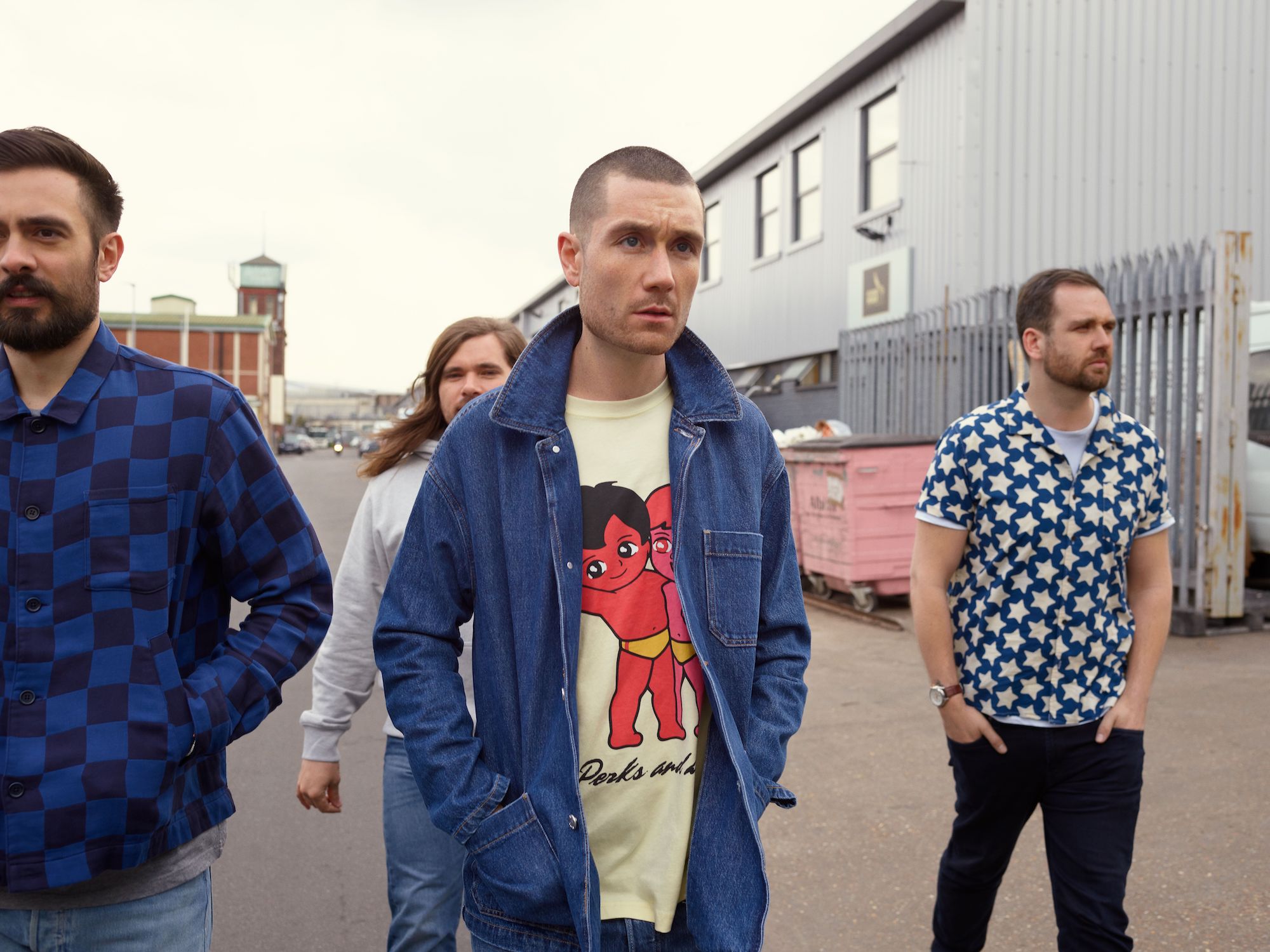
It's interesting too, because once that breath does happen, musically on the record, we go from this darker space to getting brighter and brighter. Bastille have had joyous songs before, but the hope and the inspired optimism that we're left with by the time “Those Nights” rolls into “Joy” is something that was foreign in the past.
Will Farquarson: Well I think coming back to what you said earlier from “Pompeii” to “Joy,” I think that’s quite a nice way of looking at it, because obviously “Pompeii” poses a question, “How am I going to be an optimist about this?” and “Joy” answers it with, “There are people you love, and that is what brings us joy.” And that’s what that song is about: You’ve been out all night, you’re perhaps feeling a bit worse for wear, and that person that means the most to you – whether it’s a girlfriend, a parent, a friend; it’s up to interpretation – but when they phone, your whole world is that little bit brighter. I think that, if the question posed at the beginning of, if we’re calling it a “trilogy,” on “Pompeii” is “How am I going to be an optimist?” Then that’s the answer, I guess: Just take solace in relationships and people, because all we have is people. There’s nothing else.
The only thing we have is ourselves and other people and the relationships between us and everyone else. That is life, isn’t it? Everything else is kind of just background noise.
You're so right, very true. One of the other things that is inevitable in a conversation with any of your band members is the filmic quality of your music! There's certainly this fitting sense, because of the content, to say this is that third movement. In the film world, how have you all been getting on over the past couple of years? How do you feel Doom Days fits into the narrative in terms of its music videos, and how you've been exploring those other ventures?
Will Farquarson: I think we’ve always loved cinema. We’ve always loved visual art. I myself draw on paper a lot, Dan’s very artistic and loves cinema. I’d say that’s always been a really important aspect, both with artwork for albums and posters, and for videos. I think a lot of people, a lot of bands I guess, just get trapped into making cool but bandy videos, whereas we’ve always tried to be a little more creative if we can. I think we hope to continue it… The “Those Nights” video looks really cool; a friend of ours, Tom, did it.
We also like to work with a lot of really cool people; we’re close with a few different producers and directors whom we tend to have good relationships with, particularly Tom Middleton who tours with us! It’s nice once you have those relationships, because then it becomes a conversation rather than someone presenting to you an idea. It just becomes an bonding thing. Also we’re quite hands on – particularly, Dan is; he’s got his fingers in every pie. So when we end up on auditions, there’s a lot of back and forth between directors, and I think if we’re working with people who we don’t know, it might be slightly more tense, but because we’re lucky enough to work with people we get along with, then we can all track in ideas and there’s less ego, I think. So that’s my spear, it’s definitely very important to us.
Hopping off the idea of less ego and that idea of collective ownership: A long time ago when we first discovered Bastille, we were told it was originally the solo project of a guy named Dan. By the time the debut Bad Blood came around, it was a four-piece with you, Kyle, and Chris, and then that's been the case for the better part of the decade. This record changes a bit of that: You had a lot of guests, you brought in other people. You postponed by a year in order to incorporate more voices, more instruments, more hands in the mix, more cooks in the kitchen. How is Bastille as an entity evolving, especially in the past year, and where do you see the future of this band, as you continue to progress and push yourselves?
Will Farquarson: The Dan Smith era was before any of the Bastille songs were written. That was me, Dan, and Chris, our drummer Woody, just doing completely different music. And then we became the band when we met Kyle. I think certainly there’s the core four members that is still very much Bastille. For the last five years or four years, we’ve had Charlie Barnes who plays guitar with us livel, because we didn’t have enough hands to do all the guitar parts. He’s now as much a part of the live band — he sings on the new record because he’s got an incredible voice. And I think perhaps maybe we’ve become less pressured; there was a time when we really wanted to identify ourselves. It’s kind of, when you’re a new band you want to be like, this is who we are. Now I think we’ve been doing it long enough that I don’t think there’s any ego anymore. We want it to sound amazing, and there are people who are just amazing musicians and we’re lucky enough to get to work with them and they’re lucky enough to come make a record with us. I think going forward, I can’t see that changing. I think if anything, it’ll probably just become more collaborative… We did a mixtape last year or the year before with lots of our friends on it and even working with someone like Marshmallow, which was an interesting experience! It’s nice to start thinking of different ways to make music and different people to work with, and different experiences. We could just make the same record again and again with just the four of us, but that’s tedious. I doubt anyone wants to hear Bad Blood five times in a row!
You'd be surprised! (laughs) I understand what you mean by that. So you've mentioned that you had six months to settle in and to really think and live a bit. Being in a band that just exploded all of a sudden and life was go, go, go for such a long time... How do you find peace in the odd moments when you're not doing music? What have been your outside hobbies, interests, experiences?
Will Farquarson: I have so many hobbies. I get really bored so when I’m at home, my fiancee just like can’t stand me because I kept on… So I learned to fly a plane last year, which was fun! I’m going to get my skydiving certificate this year. I think it’s my next challenge ’cause I’ve been doing aerobatic flying and they gave me a parachute and I didn’t know how to use it, so that seems useful. I moved out of London; I live on the edge of a small town on the coast. I go walking a lot within the countryside, and listen to audiobooks which is really boring… I’ve just gotten into gardening – I’m really boring! I mean flying a plane is quite cool… I ride horses occasionally… Yeah, I have no problem, when I get home from tour, in switching off and becoming much more chilled about things. I think that’s one of the nice things about having this job is essentially, my job is a massive party – so I have no compulsion when I’m at home to go out and get drunk and things like that – which is good, because most of my other friends are now married with children and have real jobs. So I’d have no one to do it with anyway.
That's fits! Can I ask you, do you have any book recommendations? Anything you've been listening or to reading lately that you'd recommend?
Will Farquarson: Oh, let me think: What’s really interesting that would be interesting to other people? There’s a book I’m reading by Philip Zimbardo called the Lucifer Effect about the Stanford Prison Experiment in the 1970s, which was where he basically got a bunch of Stanford students to pretend to be prisoners or guards and they ended up torturing each other. Then he became a defense witness in fact, for the soldiers involved in Abu Ghraib, because he showed through his research how situational causes can get people who are otherwise mentally stable to become almost evil. So that’s absolutely fascinating: He wrote it forty years after the study. It took him that long to reckon with his own involvement. It was just really surreal hearing how in a week, these normal students turned into SS officers. That’s pretty amazing. That would be my recommendation for this week!
I love it. Thank you very much. Well, listen, in closing, one of the things I really do love about this record is the sense of brightness that comes at the end. I think Doom Days opens with that sense of foreboding that we felt on Wild World, and what happens over the course of 40 minutes - much different than the hour and a half that you usually do, by the way! - is, we come to realize that everything just might be okay after all!
Will Farquarson: I think that’s our overarching message in general. It’s very easy to just be absolutely negative and feel like the world’s collapsing around you, but I think hope is what’s required if we’re to get through any of this mess.
Do you think this is something that you had to learn over the past three to four years? Do you think this is something that you required that extra life experience in order to come to that conclusion?
Will Farquarson: I think you speak to any 18 year old, and everything that happens in the world is absolutely catastrophic and we need to tear down the entire edifice and start again. You speak to most thirty-year-olds and they realize that it’s probably not the best way to think. We’re less revolutionary than we probably were when we were 18, and we’re more optimistic that we can muddle our way through. I think that’s what everyone’s doing, isn’t it? Just muddling their way through.
That's a great place to close. Will, thank you so much for your time!
Will Farquarson: You too, thanks!
— —
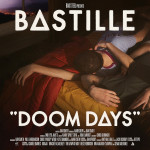
Connect with Bastille on
Facebook, Instagram, Twitter
Discover new music on Atwood Magazine
? © Bastille

